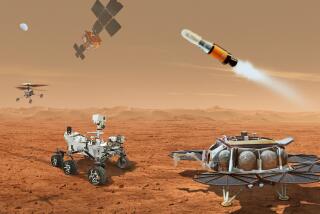Unusual Challenges From Space Travel
- Share via
“Scenario: A crewperson is found dead on the first morning on Mars. Died during sleep. Obviously an asymptomatic cardiac arrest, or previously undetected Martian virus, or suicide by poisoning, or clandestine homicide. How do we know?” The beginning of a science fiction novel? Rather it is the introduction to a selection by Robert M. Beattie Jr. in “The Case for Mars II, Volume 62” in a series published by the American Astronautical Society in 1985.
Short of a planetwide disaster, it seems inevitable that human beings will travel to Mars. Prototypes for spaceships are already on the drawing boards. Professionals including physicians, psychologists and jurists are already at work trying to anticipate problems the travelers might face. While the Mars flight will resemble other journeys of exploration, the vagaries of space make this trip more complicated than any other.
Let us assume that there is an international crew. Not only will each member have to be an expert in some skill necessary for the flight itself as well as for the exploration of the red planet, but each will have to be fluent enough in some common language to avoid unintentional slights. They will also have to be familiar with each others’ social customs. A long trip in a confined space demands special sensitivity.
And what if someone does die and the cause of death isn’t obvious. If it’s a strange new virus, the corpse has to be isolated, preserved and returned to Earth for thorough examination. If it’s suicide, there would have to be some kind of psychological post-mortem. Space flights can’t afford to lose crew members. And if it’s murder, then the corpse is evidence for a trial.
Let us assume it is murder. Then there are two possibilities: If the murderer is unknown, the whole crew will be operating in fear and suspicion throughout the entire return trip, which may last several years. And if the murderer is known, things aren’t much better. Suppose he or she is in charge of some crucial part of navigation. Of course the crew could be trained so that there is a backup for everyone. But that still leaves a long voyage in a small space with one passenger anticipating a trial for murder on re-entry. It may be wiser to use alternative justice while in space, where the captain (assuming he or she is not the accused) convenes a court and carries out the sentence while still on Mars.
The current crop of astronauts have been exceedingly healthy. None has yet of died of natural causes, and only James Irwin has a cardiac condition. However, the situation is not the same for the Soviet cosmonauts. It is not that they passed through a coarser screening process, but the Soviets have clocked many more days in space. Some have had to be assisted from the landing craft on their return to Earth.
Extended space travel may be dangerous to human health.
Beattie, a lieutenant with the Fire Department in Wichita, Kan., who works with the Boeing company, suggests that cardiopulmonary arrest will be the biggest threat to Mars-bound astronauts. The heart muscle atrophies about 5% in weightlessness because it just doesn’t have to work so hard to pump the blood. But it doesn’t revert to preflight strength upon return and a weakened heart is susceptible to attack.
Not to forget suicide. Of course there will be psychological screening but no screening is foolproof and, as Beattie points out, suicide is the fourth leading cause of death among American adults between the ages of 30 and 54.
It looks as if along with technological expertise, the pioneers of interplanetary travel will have to be masters of psychology and philosophy. The human lessons of such a journey promise to be at least as remarkable as the data they bring back from Mars.
More to Read
Sign up for The Wild
We’ll help you find the best places to hike, bike and run, as well as the perfect silent spots for meditation and yoga.
You may occasionally receive promotional content from the Los Angeles Times.






